Americans’ Views of Puerto Rico’s Recovery
Findings
Two months after Maria, a growing majority of Americans say that Puerto Ricans are not getting the help they need
In an ongoing effort to track the public’s awareness and perceptions of the impact of Hurricane Maria on people in Puerto Rico, the November Kaiser Health Tracking poll finds that most of the public (63 percent) says they are closely following news about the recovery effort. Compared to last month, and now two months after the hurricane made landfall on the island, more of the public now says people in Puerto Rico are not yet getting needed help, rising from 62 percent in October to 70 percent this month. These views vary considerably by party, but this month half of Republicans (52 percent) also say people are not yet getting the help they need, up from 38 percent in October. Similarly, most of the public (59 percent) says the federal government is not doing enough to restore electricity and access to food and water in Puerto Rico; again, slightly higher than the share last month (52 percent). On this point, most Republicans (63 percent) feel the federal government is doing enough, while majorities of independents (59 percent) and Democrats (86 percent) feel it is not.
In addition to Puerto Rico, the Texas gulf coast and Houston areas are undergoing significant rebuilding and recovery efforts after Hurricane Harvey struck in late-August. As with Puerto Rico’s recovery effort, most of the public also reports closely following news about the recovery in the Houston area after Hurricane Harvey. However, unlike views on Puerto Rico, a majority, including majorities across parties, feel that Texans affected by Hurricane Harvey are getting the help they need (60 percent).
Most Americans Report Closely Following News About Hurricane Recovery Efforts in Puerto Rico and Texas
About two months after Hurricane Maria struck Puerto Rico causing massive damage to much of the island’s basic infrastructure, most Americans (63 percent) say they’re following news about the rebuilding and recovery efforts in Puerto Rico at least somewhat closely. In comparison, a similar share of the public says they are following recovery efforts in Texas after Hurricane Harvey struck the Houston area in late-August at least somewhat closely (58 percent).
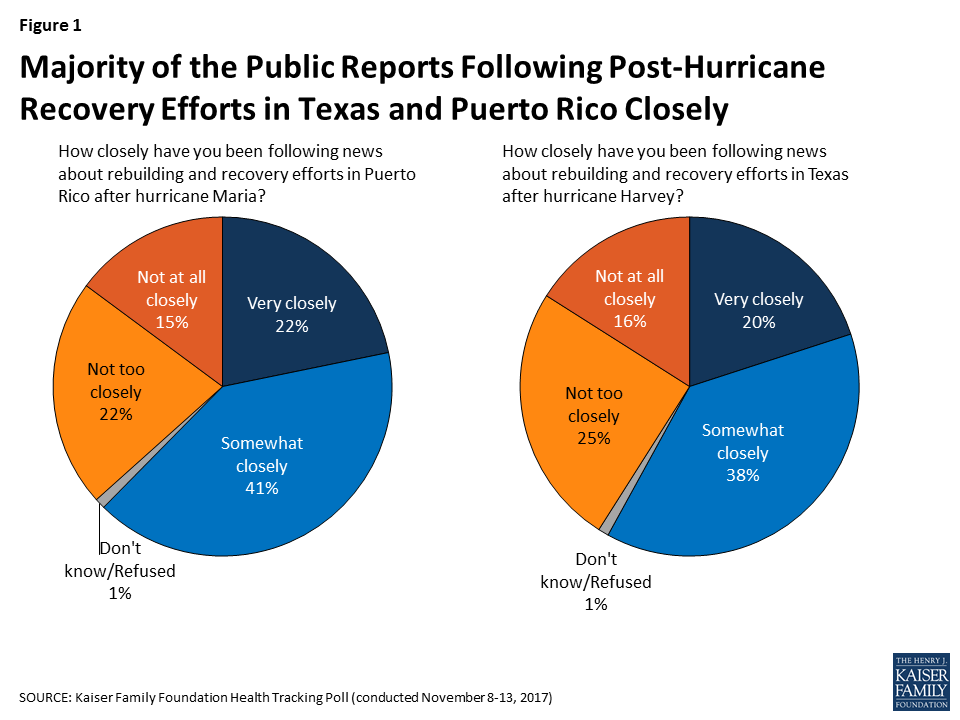
However, the share of the public that reports following news about Puerto Rico varies by party, with more Democrats (75 percent) saying they are closely following recovery efforts in Puerto Rico than independents (61 percent) and Republicans (54 percent). In contrast, there are no partisan differences for those following news about Texas; similar shares of Democrats (62 percent), independents (60 percent) and Republicans (58 percent) say they are closely following news about recovery from Hurricane Harvey.
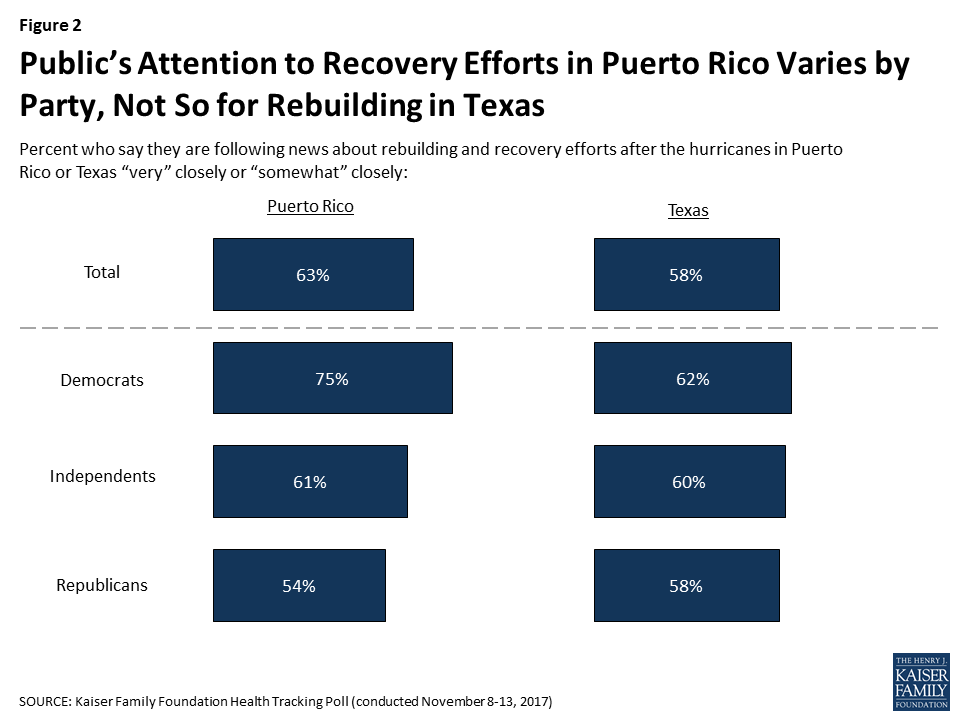
Most Feel Puerto Ricans Are Not Yet Getting Needed Help, But Say Texans Are
Seven in ten of the public feel that people in Puerto Rico are not yet getting the help they need, up from 62 percent in October 2017. These perceptions vary considerably by party, however half of Republicans (52 percent) now say Puerto Ricans aren’t yet getting needed help, up from 38 percent in October.
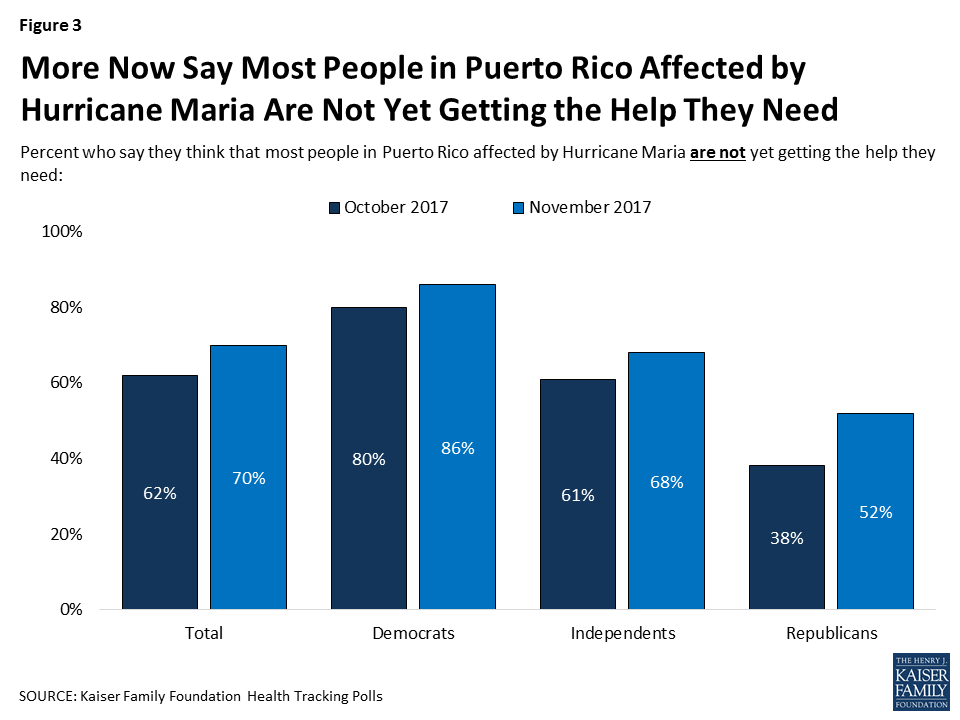
A Tale of Two Hurricanes: Most Americans say Texans are getting the help they need, but Puerto Ricans are not
On the other hand, the majority of public (60 percent) thinks people affected by Hurricane Harvey are getting the help they need. There is some variation by party, but it is not as stark as the partisan differences when asking about Puerto Rico. Overall, majorities of Democrats (54 percent), independents (61 percent), and Republicans (69 percent) say Texans affected by Hurricane Harvey are getting the help they need.
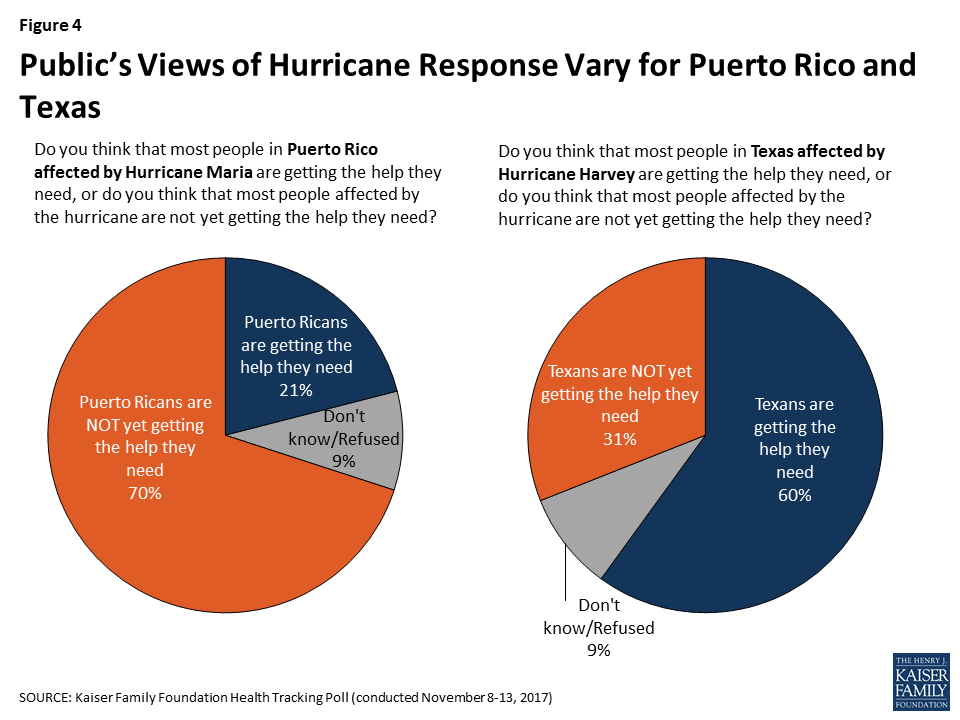
Majority of the Public Says Federal Government is Not Doing Enough in Puerto Rico
When asked whether the federal government is doing enough to restore electricity and access to food and water in Puerto Rico or not, a majority of the public (59 percent) says the federal government is not doing enough, including a majority of Democrats (86 percent) and independents (59 percent). On the other hand, most Republicans (63 percent) say the federal government is doing enough in Puerto Rico. Pessimism towards the federal government’s response has grown from 52 percent in October to 59 percent this month.
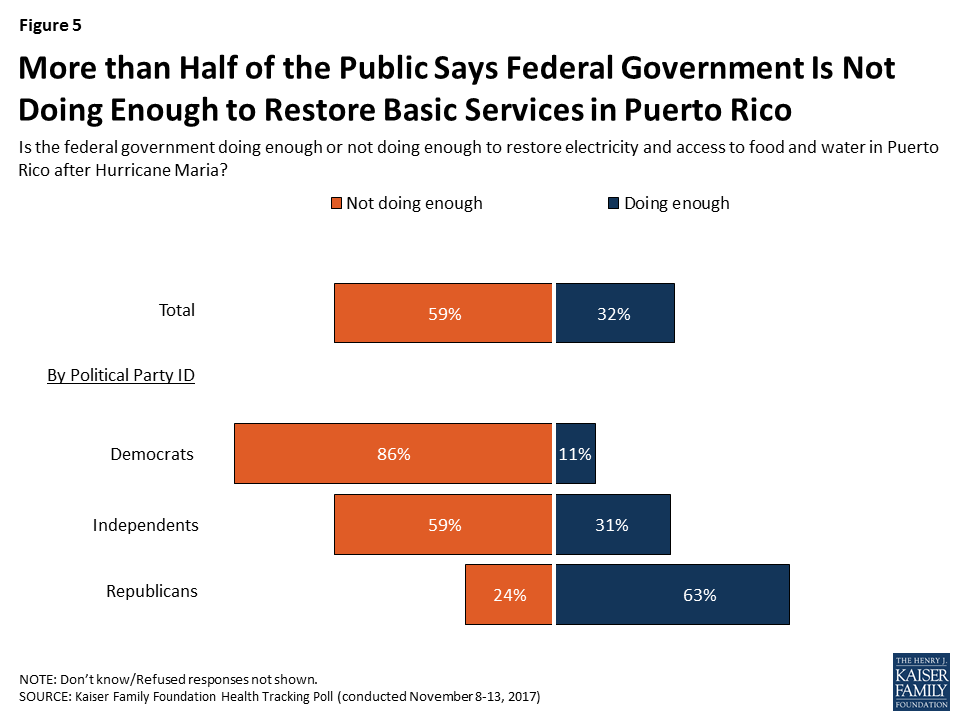
Methodology
This Kaiser Health Tracking Poll was designed and analyzed by public opinion researchers at the Kaiser Family Foundation (KFF). The survey was conducted November 8th-13th 2017, among a nationally representative random digit dial telephone sample of 1,201 adults ages 18 and older, living in the United States, including Alaska and Hawaii (note: persons without a telephone could not be included in the random selection process). Computer-assisted telephone interviews conducted by landline (415) and cell phone (786, including 482 who had no landline telephone) were carried out in English and Spanish by SSRS of Media, PA. Both the random digit dial landline and cell phone samples were provided by Marketing Systems Group (MSG). For the landline sample, respondents were selected by asking for the youngest adult male or female currently at home based on a random rotation. If no one of that gender was available, interviewers asked to speak with the youngest adult of the opposite gender. For the cell phone sample, interviews were conducted with the adult who answered the phone. KFF paid for all costs associated with the survey.
The combined landline and cell phone sample was weighted to balance the sample demographics to match estimates for the national population using data from the Census Bureau’s 2016 American Community Survey (ACS) on sex, age, education, race, Hispanic origin, and region along with data from the 2010 Census on population density. The sample was also weighted to match current patterns of telephone use using data from the July-December 2016 National Health Interview Survey. The weight takes into account the fact that respondents with both a landline and cell phone have a higher probability of selection in the combined sample and also adjusts for the household size for the landline sample. All statistical tests of significance account for the effect of weighting.
The margin of sampling error including the design effect for the full sample is plus or minus 3 percentage points. Numbers of respondents and margins of sampling error for key subgroups are shown in the table below. For results based on other subgroups, the margin of sampling error may be higher. Sample sizes and margins of sampling error for other subgroups are available by request. Note that sampling error is only one of many potential sources of error in this or any other public opinion poll. Kaiser Family Foundation public opinion and survey research is a charter member of the Transparency Initiative of the American Association for Public Opinion Research.
| Group | N (unweighted) | M.O.S.E. |
| Total | 1,201 | ±3 percentage points |
| Party Identification | ||
| Democrats | 398 | ±6 percentage points |
| Republicans | 298 | ±7 percentage points |
| Independents | 392 | ±6 percentage points |